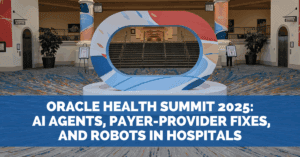At this year’s Oracle Health Summit in Orlando, the company rolled out a broad set of announcements that doubled down on AI while weaving its ERP and supply chain platforms more tightly into healthcare.
Healthcare IT Today was onsite to hear the news and talk directly with Oracle Health customers about how these technologies are showing up in practice. Here is our recap video from the event.
A Strategy of Openness
Seema Verma, EVP & GM of Oracle Health and Life Sciences, opened the Summit by positioning Oracle as a partner rather than a gatekeeper.
“We have the humility to say that nobody has an exclusive hold on innovation. We want our customers and we want patients to be able to avail themselves of the best products out there. We think that’s so important to the sustainability of the healthcare system to drive quality and to drive better access.”
That philosophy underpins new initiatives like the AI Center of Excellence, a new hub where providers can, amongst other things, create and share AI agents. It also extends to Oracle’s push to reduce friction between payers and providers. The company previewed new automation tools aimed at cutting through one of healthcare’s most persistent pain points: prior authorization and reimbursement delays.
Another announcement focused on clinical trial integration, bringing trial enrollment and matching directly into the EHR. Oracle executives framed this as a way to expand access for patients, simplify workflows for physicians and give researchers more representative participant pools. This was driven home with a powerful keynote from a mother of a 20-year old who had been battling Stage 4 childhood cancers since the age of 5.
AI in Action
Much of the Summit centered on Oracle’s clinical AI agent, which listens to physician-patient encounters and generates draft notes. Customer feedback highlighted reductions in documentation time, higher quality notes, and less cognitive burden for clinicians.
Dr. Randy Thompson, Chief Health Analytics Officer at Billings Clinic, said the benefit goes beyond efficiency: “Some providers say, AI wrote a better note than I would’ve on my own – because it captured more of the details that the patient was relaying to me and it put more problems on the diagnosis.”
The positive impact was immediate, even for clinicians who were hesitant to try it. Dr. Ryan McFarland, Medical Director at Hudson Physicians, shared that even one veteran physician called his AI-generated note “the best I’ve written in 40 years.”
At Beacon Health System, the value was measured in quality of life. Dr. Scott Eshowsky, Chief Medical Information Officer, shared a story of a fellow physician using Oracle’s Clinical AI Agent for the first time: “Her comment was, I’m going to need to figure out what to do with myself on Sunday afternoons because I don’t have to chart anymore.”
Supply Chain Moves Center Stage
Oracle placed strong emphasis on ERP and supply chain at the Summit. One of the key messages was the integration of robotics, advanced inventory management, and AI into hospital logistics, ensuring supplies move faster and with fewer human touchpoints.
Kristin Miles, VP of Healthcare Product Strategy for Oracle, highlighted the new partnership with ST Engineering Aethon:
“We partnered with [ST Engineering Aethon] so that when a delivery is picked in the storeroom, you can notify a robot to come get it. The robot shows up, you put the items in the cart, and off they go. The robot can manage elevators. It knows which floor to go to, and then it can drop off the supplies.”
By linking Oracle’s ERP directly to robotic delivery, the company is building a closed loop from inventory management to fulfillment. Hospitals gain greater visibility into supplies, can predict shortages earlier, and reduce reliance on manual transport. It’s a model borrowed from retail and logistics but now adapted for the unique demands of healthcare.
The Takeaway
Oracle’s decision to embed AI directly into the EHR is looking prophetic, given the adoption and enthusiasm around their Clinical AI Agent. It is now producing measurable results: more complete notes, improved physician satisfaction, and fewer late-night hours spent catching up on documentation.
At the same time, Oracle is leaning into one of its biggest competitive advantages: its established suite of enterprise platforms across ERP, HR, and finance. These systems already power some of the most complex industries in the world. Bringing that operational strength into healthcare — and combining it with AI-driven clinical workflows — gives Oracle a differentiated position in a market that has long struggled to align front-office care delivery with back-office operations.
Questions remain about governance, integration, and adoption at scale. But if this year’s Summit is any indication, Oracle Health has moved past the phase of bold promises. Customers across community practices, health systems, and academic centers are already putting these AI and ERP tools to work – and they’re seeing tangible results.
Learn more about Oracle Health at https://www.oracle.com/health/




